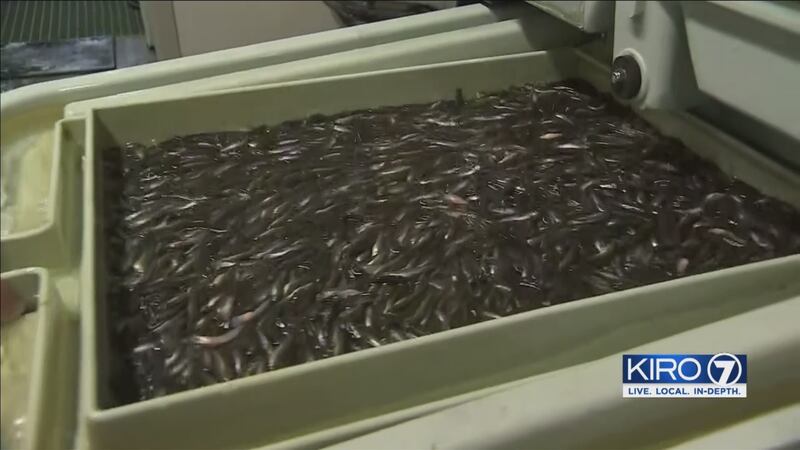GIG HARBOR, Wash. — A power outage on Friday killed more than 6 million salmon at the Minter Creek state fish hatchery near Gig Harbor.
The loss includes more than 500,000 White River Spring chinook salmon being raised specially to help the southern resident orcas survive.
Fast-moving water is pumped in to provide oxygen to their incubators but at 5:30 p.m. on Friday a storm knocked the power out and the salmon began to suffocate.
“It's only a matter of minutes really, 15-20 minutes and we'll start to lose fish,” said Jim Jenkins, who manages Southern Puget Sound hatcheries for the Department of Fish and Wildlife.
The water is pumped from a creek. A backup generator is supposed kick-in automatically and run the pumps when the power goes out, but it failed to start.
“Was it the automated system, the components that trigger it was the sensors, was it the starting system, was it the carburation system?” Jenkins said there will be an investigation to find the answer. He said the generator was tested in October and worked as it is supposed to.
Scroll down to continue reading
More news from KIRO 7
- Tornado caused 'catastrophic damage' in Kitsap County, sheriff says
- PHOTOS: Damage from Tornado in Port Orchard
- 'Porch pirate' chased, captured by neighbors; also captured on video
- Power outage causes death of 6.2 million chinook salmon fry at state-run hatchery
- Do you have an investigative story tip? Send us an email at investigate@kiro7.com
In all, 6.2 million chinook salmon died, but the focus is on the 500,000 to 600,000 White River Spring chinook. That’s because most of the adults would return to Puget Sound in the spring of 2022 when other types of fish that orcas eat are less plentiful.
Those fighting to save the orcas say the loss is another reason to be sure that orcas can get to the food they need now, so they can better survive the shortages they face in the coming years. They say that means proceeding with plans to keep whale watching boats and other ships away from the southern resident orcas to make it easier for the whales to listen for the fish they need.
Asked if the loss of the salmon is a catastrophe, orca advocate Donna Sandstrom replied, “Catastrophe is a big word, I don't think so. It’s a setback certainly in the plan."
Jenkins says he doesn’t want to minimize the loss of the fish, but, “It is not the fundamental large component of the entire program, it is a piece of the program, one we don't want to lose, but it is not 100 percent of the effort.”
He says many more White River salmon are being raised at a different hatchery that was not affected by the power outage.
Cox Media Group








